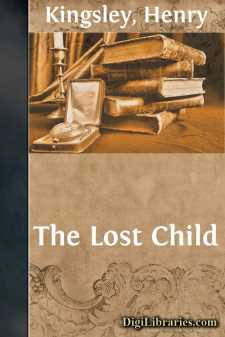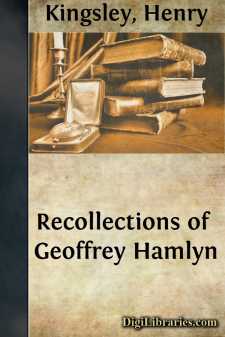Categories
- Antiques & Collectibles 13
- Architecture 36
- Art 48
- Bibles 22
- Biography & Autobiography 813
- Body, Mind & Spirit 142
- Business & Economics 28
- Children's Books 17
- Children's Fiction 14
- Computers 4
- Cooking 94
- Crafts & Hobbies 4
- Drama 346
- Education 46
- Family & Relationships 57
- Fiction 11829
- Games 19
- Gardening 17
- Health & Fitness 34
- History 1377
- House & Home 1
- Humor 147
- Juvenile Fiction 1873
- Juvenile Nonfiction 202
- Language Arts & Disciplines 88
- Law 16
- Literary Collections 686
- Literary Criticism 179
- Mathematics 13
- Medical 41
- Music 40
- Nature 179
- Non-Classifiable 1768
- Performing Arts 7
- Periodicals 1453
- Philosophy 64
- Photography 2
- Poetry 896
- Political Science 203
- Psychology 42
- Reference 154
- Religion 513
- Science 126
- Self-Help 84
- Social Science 81
- Sports & Recreation 34
- Study Aids 3
- Technology & Engineering 59
- Transportation 23
- Travel 463
- True Crime 29
The Lost Child
by: Henry Kingsley
Categories:
Description:
Excerpt
THE LOST CHILD.
Remember? Yes, I remember well that time when the disagreement arose between Sam Buckley and Cecil, and how it was mended. You are wrong about one thing, General; no words ever passed between those two young men: death was between them before they had time to speak.
I will tell you the real story, old as I am, as well as either of them could tell it for themselves; and as I tell it I hear the familiar roar of the old snowy river in my ears, and if I shut my eyes I can see the great mountain, Lanyngerin, bending down his head like a thorough-bred horse with a curb in his mouth; I can see the long grey plains, broken with the outlines of the solitary volcanoes Widderin and Monmot. Ah, General Halbert! I will go back there next year, for I am tired of England, and I will leave my bones there; I am getting old, and I want peace, as I had it in Australia. As for the story you speak of, it is simply this:—
Four or five miles up the river from Garoopna stood a solitary hut, sheltered by a lofty bare knoll, round which the great river chafed among the boulders. Across the stream was the forest sloping down in pleasant glades from the mountain; and behind the hut rose the plain four or five hundred feet overhead, seeming to be held aloft by the blue-stone columns which rose from the river-side.
In this cottage resided a shepherd, his wife, and one little boy, their son, about eight years old,—a strange, wild little bush child, able to speak articulately, but utterly without knowledge or experience of human creatures, save of his father and mother; unable to read a line; without religion of any sort or kind; as entire a little savage, in fact, as you could find in the worst den in your city, morally speaking, and yet beautiful to look on; as active as a roe, and, with regard to natural objects, as fearless as a lion.
As yet unfit to begin labour; all the long summer he would wander about the river bank, up and down the beautiful rock-walled paradise where he was confined, sometimes looking eagerly across the water at the waving forest boughs, and fancying he could see other children far up the vistas beckoning to him to cross and play in that merry land of shifting lights and shadows.
It grew quite into a passion with the poor little man to get across and play there; and one day when his mother was shifting the hurdles, and he was handing her the strips of green hide which bound them together, he said to her,—
"Mother, what country is that across the river?"
"The forest, child."
"There's plenty of quantongs over there, eh, mother, and raspberries? Why mayn't I get across and play there?"
"The river is too deep, child, and the Bunyip lives in the water under the stones."
"Mother, what country is that across the river?""Who are the children that play across there?"
"Black children, likely."
"No white children?"
"Pixies; don't go near 'em, child; they'll lure you on, Lord knows where. Don't get trying to cross the river, now, or you'll be drowned."
But next day the passion was stronger on him than ever. Quite early on the glorious cloudless midsummer day he was down by the river-side, sitting on a rock, with his shoes and stockings off, paddling his feet in the clear tepid water, and watching the million fish in the shallows—black fish and grayling—leaping and flashing in the sun.
There is no pleasure that I have ever experienced like a child's midsummer holiday,—the time, I mean, when two or three of us used to go away up the brook, and take our dinners with us, and come home at night tired, dirty, happy, scratched beyond recognition, with a great nosegay, three little trout and one shoe, the other having been used for a boat till it had gone down with all hands out of soundings....



